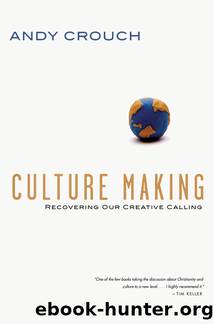Culture Making: Recovering Our Creative Calling by Andy Crouch

Author:Andy Crouch [Crouch, Andy]
Language: eng
Format: epub
Tags: Religion, Christian Living, Social Issues, Social Science, popular culture, Self-Help, Creativity
ISBN: 9780830874842
Google: SdV5ifPMlnIC
Publisher: InterVarsity Press
Published: 2013-10-24T00:09:24.447523+00:00
The Problem of the Gentiles
Many movies begin with a dramatic sequence of events that sets the plot in motion and sets up the key characters, conflicts and themes that will drive the rest of the story. Pentecost serves that function in Acts: a telling, tantalizing beginning that makes us realize that for all the drama of the resurrection, even more extraordinary events are still to come. But strangely, few modern Christians have paid close attention to Actsâ dramatic structure. Itâs as if someone had seen a thrilling chase sequence from the beginning of a James Bond film but neglected to keep watching, unaware that an even more dramatic chase scene occurs near the end. The story of Pentecost is widely known, but in fact it just sets in motion a series of developments that culminate in the first and most important crisis of the early church. And that crisis has everything to do with cultureâindeed, it might be said to be the place where the issue of faith and culture is most directly raised in the entire New Testament.
In spite of their many adopted cultural and linguistic backgrounds, the entire audience at Pentecost is Jewish, still closely identified with the cultural project of Israel. But the unfolding drama of Acts soon brings the apostles and other early Christians into contact with Gentiles, called in Greek ta ethnÄâthe ânationsââboth religiously and culturally distinct from Israel. The story unfolds in a quite specific order. After the stoning of Stephen in Acts 7, Luke tells us that âa severe persecution began against the church in Jerusalem, and all except the apostles were scattered throughout the countryside of Judea and Samariaâ (Acts 8:1). One of the scattered ones, Philip, goes to Samaria, a borderland of dubious legitimacy to purity-conscious Jews from Jerusalem, where he encounters the distinctly unorthodox practice of magicâand sees both people and magician come to faith. Next comes Philipâs encounter with the Ethiopian eunuch, almost certainly not a member of the nation of Israel (both because of his nationality and because the cultural practice of making eunuchs of important officials was specifically forbidden in the Jewish law) but also clearly a regular visitor to Jerusalem and student of the Hebrew Scriptures.
Not long afterward Peter finds himself staying at the house of Simon, âa tannerâ (Acts 9:43)âan occupation that was widely considered unclean by Jews, suggesting that Peter had already begun to relax his practices of cultural purityâwhen he is called to the house of the Roman centurion Cornelius, an unmistakable Gentile, though also âa devout man who feared God with all his householdâ (Acts 10:2). This invitation prompts Peterâs anguished lunchtime conversation with Jesus himself in a vision, where Jesus asks Peter to set aside the laws of kosher food, one of the most central boundary markers of Israelâs cultural identity, in order to proclaim the gospel in Corneliusâs house. Standing in a Gentileâs house, a place he has probably never been before in his life, Peter utters these astonished (and
Download
This site does not store any files on its server. We only index and link to content provided by other sites. Please contact the content providers to delete copyright contents if any and email us, we'll remove relevant links or contents immediately.
Machine Learning at Scale with H2O by Gregory Keys | David Whiting(4314)
Never by Ken Follett(3960)
Fairy Tale by Stephen King(3401)
Reminders of Him: A Novel by Colleen Hoover(3125)
The Man Who Died Twice by Richard Osman(3082)
Will by Will Smith(2928)
It Starts With Us (It Ends with Us #2) by Colleen Hoover(2370)
Rationality by Steven Pinker(2369)
Can't Hurt Me: Master Your Mind and Defy the Odds - Clean Edition by David Goggins(2344)
Friends, Lovers, and the Big Terrible Thing by Matthew Perry(2234)
The Becoming by Nora Roberts(2207)
The Stranger in the Lifeboat by Mitch Albom(2127)
Love on the Brain by Ali Hazelwood(2080)
New Morning Mercies: A Daily Gospel Devotional by Paul David Tripp(1920)
A Short History of War by Jeremy Black(1851)
The Strength In Our Scars by Bianca Sparacino(1847)
HBR's 10 Must Reads 2022 by Harvard Business Review(1847)
A Game of Thrones (The Illustrated Edition) by George R. R. Martin(1751)
Never Finished: Unshackle Your Mind and Win the War Within by David Goggins(1715)
